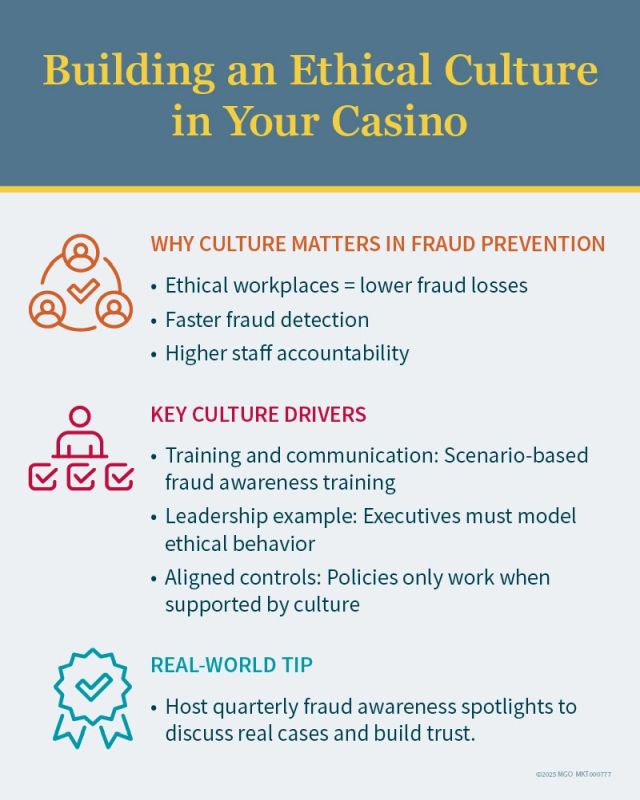- within Criminal Law topic(s)
- within Government, Public Sector, Transport and Real Estate and Construction topic(s)
- with readers working within the Accounting & Consultancy industries
Key Takeaways:
- Ethical training and leadership can help reduce fraud risk in your casino operations.
- Fraud prevention begins with employee awareness, transparency, and well-communicated policies.
- Internal audit and risk management efforts are strengthened by a culture that prioritizes accountability.
—
In any casino or Tribal gaming operation, the risk of fraud is an ongoing concern. With high-volume transactions, cash-intensive environments, and multiple operational layers, even well-structured controls can fall short — especially when the organizational culture does not support them.
That's why your most effective line of defense isn't just a system or checklist; it's your people. How they understand expectations, perceive risk, and feel empowered to raise concerns directly influences your organization's vulnerability to fraud.
The Human Side of Risk
When employees know what's expected and see ethical behavior valued in practice, they're more likely to do the right thing — and speak up when something doesn't seem right.
Organizations that emphasize ethics and transparency often experience earlier issue detection and fewer instances of internal fraud. But that kind of culture isn't built overnight. It requires leadership, communication, and a consistent message that ethics are part of how the business runs.
In regulated environments like gaming, where reputational and compliance risks are high, building an ethical foundation can offer both protection and a strategic advantage.

It Starts with Awareness
Employees don't always recognize how certain actions — like offering excessive comps, skipping documentation, or bypassing approval workflows — can trigger risk. Regular, practical training helps close that gap.
Effective ethics training should be more than a once-a-year checkbox. It should reflect real-world scenarios and encourage open dialogue. Share anonymized examples of past issues, explore how breakdowns happen, and help staff understand their role in upholding financial integrity.
How leadership responds when someone raises a concern often sends the clearest message about what your organization values.
Leadership Shapes Culture
Ethics must be proven — not just stated. When senior leaders model accountability, ethical behavior becomes the standard across the organization.
This includes how issues are addressed, how support is shown for audit and compliance teams, and how ethics are reflected in performance discussions. When integrity is embedded in daily decisions, it helps foster consistency across departments.
Aligning Controls with Culture
While internal controls are essential — segregation of duties, dual approvals, surprise audits — they're most effective when backed by a culture that supports their purpose.
For instance, employees are more likely to follow promotion approval processes when they understand why the rules exist. Controls are embraced, not resisted, when they're reinforced by open communication and consistent expectations.
A culture that values transparency doesn't cut fraud risk, but it creates an environment where controls are more likely to succeed.
A Real-World Perspective
One gaming organization created quarterly "Fraud Awareness Spotlights" using anonymized case studies to highlight areas where controls had been bypassed. These discussions opened space for employees to ask questions, learn from past missteps, and better understand their role in prevention.
Over time, the organization saw an increase in early reporting of process issues — helping management act before small problems escalated.
This wasn't about policing behavior; it was about creating shared ownership over risk.
Sustaining the Effort
Building a culture of ethics is not a one-time initiative. It requires ongoing reinforcement through regular training, consistent communication, and support from leadership at all levels.
The content of this article is intended to provide a general guide to the subject matter. Specialist advice should be sought about your specific circumstances.


